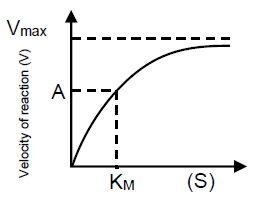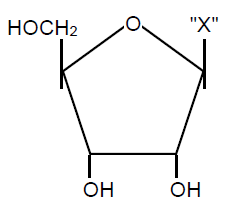In curve of enzyme catalyzed reaction, the value of velocity of enzyme reaction at point A will be

1. and velocity may increase by increasing temperature
2. and velocity may increase by increasing substrate
3. and velocity may increase by increasing by catalyst
4. and velocity remain constant even changing any factor in to the medium.

2. and velocity may increase by increasing substrate
3. and velocity may increase by increasing by catalyst
4. and velocity remain constant even changing any factor in to the medium.
Which one of the following enzymes carries out the initial step in the digestion of milk in humans?
1. Pepsin
2. Rennin
3. Lipase
4. Trypsin
Given below is the diagrammatic representation of one of the categories of small molecular weight organic compounds in the living tissues. Identify the category shown and the one blank component "X" in it.

Category Component
1. Cholesterol Guanine
2. Amino acid NH2
3. l Nucleotide Adenine
4. Nucleoside Uracil

To unlock all the explanations of 38 chapters you need to be enrolled in MasterClass Course.

To unlock all the explanations of 38 chapters you need to be enrolled in MasterClass Course.
Which one of the following is a non-reducing carbohydrate?
| 1. | Maltose |
| 2. | Sucrose |
| 3. | Lactose |
| 4. | Ribose 5-phosphate |
Select the option which is not correct with respect to enzyme action:
1. Substrate binds with enzyme at its active site.
2. Addition of a lot of succinate does not reverse the inhibition of succinic dehydrogenase by malonate.
3. A non-competitive inhibitor binds the enzyme at a site distinct from that which binds the substrate.
4. Malonate is a competitive inhibitor of succinic dehydrogenase.

To unlock all the explanations of 38 chapters you need to be enrolled in MasterClass Course.

To unlock all the explanations of 38 chapters you need to be enrolled in MasterClass Course.
Which one of the following statements is incorrect?
| 1. | In competitive inhibition, the inhibitor molecule is not chemically changed by the enzyme. |
| 2. | The competitive inhibitor does not affect the rate of breakdown of the enzyme-substrate complex. |
| 3. | The presence of the competitive inhibitor decreases the Km of the enzyme for the substrate. |
| 4. | A competitive inhibitor reacts reversibly with the enzyme to form an enzyme-inhibitor complex. |
In sea urchin DNA, which is double stranded, 17% of the bases were shown to be cytosine. The percentages of the other three bases expected to be present in this DNA are :
1. G 17%, A 16.5%,T32.5%
2. G 17%, A 33%,T 33%
3. G8.5%,A50%, T24.5%
4. G 34%,A 24.5%,T 24.5%

To unlock all the explanations of 38 chapters you need to be enrolled in MasterClass Course.

To unlock all the explanations of 38 chapters you need to be enrolled in MasterClass Course.
Which one of the following is not applicable to RNA?
1. 5’ phosphoryl and 3’ hydroxyl ends
2. Heterocyclic nitrogenous bases
3. Chargaff’s rule
4. Complementary base pairing

To unlock all the explanations of 38 chapters you need to be enrolled in MasterClass Course.

To unlock all the explanations of 38 chapters you need to be enrolled in MasterClass Course.
Which of the following biomolecules does have phosphodiester bond ?
1. Monosaccharides in a polysaccharide
2. Amino acids in a polypeptide
3. Nucleotides in a Nucleic acid
4. Fatty acids in a diglyceride

To unlock all the explanations of 38 chapters you need to be enrolled in MasterClass Course.

To unlock all the explanations of 38 chapters you need to be enrolled in MasterClass Course.
A typical fat molecule is made up of :
1. Three glycerol and three fatty acid molecules
2. Three glycerol molecules and one fatty acid molecule
3. One glycerol and three fatty acid molecules
4. One glycerol and one fatty acid molecule

To unlock all the explanations of 38 chapters you need to be enrolled in MasterClass Course.

To unlock all the explanations of 38 chapters you need to be enrolled in MasterClass Course.






